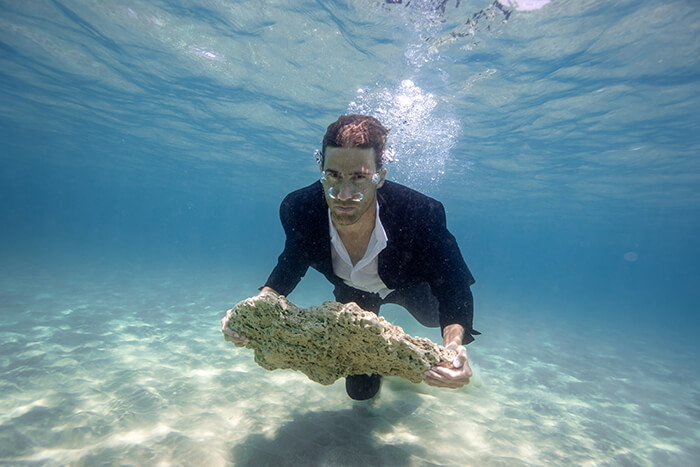How Mental Resilience Changed My Career
I recall dozens of experiences from my personal and professional life—moments when fear paralyzed and overwhelmed my body. My heart rate skyrocketed, my body felt completely constricted, as if all my muscles locked up at once. The air barely flowed into my lungs, and my brain struggled to process information—just an overwhelming sensation of danger and complete paralysis.
This happened to me when I surfed in dangerous storms when I found myself alone at sea with damaged equipment, surrounded by massive waves, not knowing how I would make it out safely. It also happened to me in decisive heats in international competitions when I knew that the next few seconds would determine whether I would become a champion or be left behind. Moments when the pressure reached its peak, and my brain had to choose between collapsing or finding a way to rise above fear.
I remember the unimaginable gap between the ultimate sense of freedom during a successful race—the feeling of gliding over the water, where every movement is intuitive and precise—versus the sensation of paralysis and suffering that took over when something went wrong. The real difference between the two? The mental muscle.
Without the deep mental training processes I underwent as part of my preparation for critical moments, I would not have achieved the successes I reached. It was always the key advantage that made the biggest difference for me—to the point that I reached the number one spot in the world. Mental resilience is what separates those who succumb to pressure from those who conquer it.
Mental Resilience: Turning Crises into Growth Opportunities
What if you could face any challenge in life without losing your balance? Mental resilience is the ability to do exactly that—to turn every crisis into an opportunity for growth. Research shows that resilience is not just an innate trait but a skill that can be developed and strengthened.
What is Mental Resilience, and Why is it Essential for Success?
Mental resilience is the ability to withstand life’s challenges, move through them, and transform them into growth engines. It is not an innate talent—it is an acquired skill, an anchor that allows us to maintain balance even in stormy moments, turn pressure into power, and face the unknown with inner strength.
Definition of Mental Resilience: A system of skills that enables individuals to handle stress, change, and uncertainty in an effective and growth-oriented manner.
Mick Fanning and the Shark Attack
Mick Fanning, an Australian surfer, experienced a life-shaking event during the final of the World Surfing Championship in South Africa in 2015 when he was attacked by a shark on live television. Thanks to his quick reaction and the mental resilience he developed throughout his career, he managed to fend off the shark and escape the water unharmed. This incident highlights the importance of mental resilience in handling extreme stress situations.
After the event, Fanning faced significant mental repercussions, including fear and anxiety about returning to the water. Instead of succumbing to fear, he chose to confront it directly. Fanning used techniques such as meditation, deep breathing, and focusing on the present moment to control his thoughts and maintain his composure. Additionally, he relied on the support of family, friends, and professional colleagues to strengthen his mental state.
Fanning shared that after the event, he considered retiring from surfing, but ultimately, he decided to return to the water and continue his professional career. His ability to cope with trauma and move forward stemmed from his focus on his goals, his love for surfing, and his understanding that overcoming fear is the key to personal and professional growth.
Fanning’s story serves as an inspiration to anyone facing challenges and crises. It demonstrates how mental resilience, social support, and goal orientation can help individuals cope with trauma and turn setbacks into opportunities for growth and development.
The Importance of Sleep in Building Mental Resilience
Sleep is a fundamental component of our ability to manage stress, develop mental resilience, and maintain optimal performance. Studies by leading scientists such as Dr. Andrew Huberman and Matthew Walker show that sleep deprivation causes severe disruptions in the brain and body, leading to extreme emotional responses, reduced mental and physical performance, and increased levels of cortisol—the hormone associated with stress and burnout.
For example, a study by Matthew Walker found that people who slept less than six hours a night experienced a 30% increase in cortisol levels in the morning compared to those who slept 7-9 hours. This condition leads to high levels of stress and prolonged exhaustion.
The effects of sleep deprivation are also evident in daily behavior: heightened impatience, extreme emotional reactions, and difficulty regulating emotions. How many of us have experienced a draining day where every little thing irritated us? In most cases, poor sleep is one of the primary causes.
Quality sleep allows us to process emotional experiences and improve our ability to handle crises, making it one of the most significant tools in developing mental resilience. If you want to strengthen your resilience—start by improving your sleep.
The Negative Feedback Loop of Sleep Deprivation
When we sleep less than the recommended 7-9 hours for adults, we enter an unhealthy cycle:
- Increased impatience and emotional outbursts – Studies show that sleep deprivation amplifies extreme emotional responses.
- Weakened ability to process past traumas – Quality sleep aids emotional processing and maintains mental stability.
- Increased cravings for sugar and caffeine – Sleep deprivation heightens hunger, leading to excessive consumption of simple carbohydrates, which create an energy crash cycle.
- Elevated cortisol levels – Poor sleep keeps the body in a state of chronic stress, leading to mental fatigue and burnout.
- Lack of mental clarity and reduced peak performance – During sleep, the brain undergoes detoxification, nerve cell renewal, and memory enhancement. Without sufficient sleep, cognitive abilities are significantly impaired.
How to Improve Sleep Quality?
- Maintain a consistent routine – Go to bed and wake up at the same time every day.
- Reduce screen exposure before bed – Blue light disrupts melatonin production.
- Create a dark and cool sleeping environment – An ideal sleep setting improves sleep quality.
- Engage in physical activity during the day – Helps regulate sleep hormones and reduce stress.
- Avoid caffeine in the evening – Caffeine stays in the body for hours and can disrupt sleep quality.
Quality sleep is the foundation of every aspect of mental resilience—it enables us to handle stress, regulate emotions, and sustain high energy levels over time.
How to Develop Mental Resilience – The Model of the World’s Top Performers
Mental resilience is not just a personal trait but a mindset that can be learned and applied. Now that we understand its importance, it’s worth examining how it manifests in the real world. Examples from leading companies and influential leaders show that the ability to handle crises and make decisions under uncertainty is a critical factor in success.
Think about it: Netflix. In its early days, it seemed like just another company destined to disappear. Performance declines nearly wiped it out. Instead of surrendering, the company’s leaders, led by Reed Hastings, chose to see the crisis as an opportunity. They didn’t just recover—they reinvented their entire business model. From a place of complete uncertainty, they created one of the world’s largest media companies. It wasn’t just about technology; it was about mindset—courage, vision, and the ability to embrace the unknown.
On the other hand, Blockbuster, once a dominant brand with thousands of stores worldwide, failed to recognize the potential of the streaming revolution. Instead of adapting to change, it clung to its physical store model. The result? Blockbuster became a symbol of missed opportunity, while Netflix established itself as a global leader.
What is mental resilience? Exactly this—the ability to see a crisis as an opportunity for growth.
And this reminds me of my own personal story as an Olympic windsurfer. Until 2012, I was considered the fastest windsurfer in strong winds. But then, my competitors studied me and developed new, improved techniques. I realized I had no choice! Instead of clinging to traditional training methods, I had to evolve. I adopted a new approach: I trained with smaller, faster equipment alongside a partner who specialized in that gear. Within a few months, we developed entirely new techniques, and within a year, I was back to being the fastest windsurfer in the world.
The lesson is clear: only when we embrace change and find opportunities in uncertainty can we make significant leaps forward.
Tools for Building Resilience
1. Be Present in the Moment – Like Riding the Perfect Wave
In surfing, when you’re on the right wave, all that exists is the present moment. Research shows that every 13 seconds, we get distracted, but on the wave—there’s no room for distractions. It’s the moment where you react to the now while anticipating the future.
Imagine yourself taking a deep breath, fully experiencing presence. You’re not just “here”—you’re leading. Now, do this in life as well: Pause. Take a deep breath. How do you develop mental resilience? Start with presence and deep inner listening.
2. When Pain Arises, Turn It into Fuel
True resilience is built not by avoiding difficult emotions but by transforming them into a growth engine.
Steve Jobs, who was fired from Apple—the company he founded—experienced a massive crisis. But instead of running away, he asked: How can I turn this pain into an advantage?
When you face fear, failure, or pain:
- Ask yourself: What is this pain trying to teach me?
- Write about it. See how it becomes a tool for insight.
3. Find Your Flow in Nature – Renewal for Mind and Body
Modern life exhausts us. But nature is always there, waiting to reconnect us to ourselves.
Building mental resilience starts with disconnecting from mental overload and reconnecting with nature. Studies show that exposure to nature—even for a few minutes—not only boosts performance but also provides mental clarity and calm.
4. Embrace the Unknown – Turn It into a Field of Opportunities
The ability to embrace the unknown is one of the most crucial resilience tools. It drives creativity, courage, and transformation.
When Netflix faced declining performance, it didn’t stay stuck in the past—it embraced the new, created a vision, and won.
How do you build mental resilience? Stop fearing the unknown and start seeing it as a space of endless possibilities.
The PH-BASIC Model – A Systematic Approach to Building Resilience
To develop mental resilience in a structured way, you can use the PH-BASIC model, developed by Professor Mooli Lahad. This model focuses on identifying and utilizing personal coping resources and offers seven key resilience-building channels:
- Physical (P) – Engaging in physical activity and maintaining body health.
- Cognitive (C) – Learning, thinking, and problem-solving.
- Emotional (E) – Expressing emotions and managing feelings.
- Social (S) – Building interpersonal relationships and social support.
- Belief (B) – Connecting to values, faith, and life’s meaning.
- Imagination (I) – Utilizing creativity and visualization.
- Mental (M) – Practicing self-reflection and awareness.
This model provides a holistic approach to resilience development and aligns perfectly with the leading tools presented earlier. Integrating these elements into daily life strengthens the ability to navigate crises and emerge stronger.
Further Reading
For those who want to dive deeper and learn how to apply this model in everyday life, it’s recommended to explore:
- PH-BASIC – Developing Mental Resilience
- How to Build Long-Term Resilience
- Adopting Daily Habits for Internal Strength and Growth
- Using Mental Resilience Models to Analyze and Understand Past Experiences
- Studying Research on Resilience and Implementing Proven Strategies for Handling Pressure
- Enhancing Skills in Mental Toughness, Positive Psychology, and Strength-Based Focus
How to Take Your Mental Resilience to the Next Level?
If you want to apply these tools in a structured way and turn them into habits that enhance your performance, I’ve created a special training series called GAME CHANGER.
It’s a fast-track program designed to provide you with mental tools for peak performance and an effective lifestyle.
📌 Discover more here: GAME CHANGER
Final Thoughts – Start Strengthening Your Mental Resilience Today
Mental resilience is not just a survival tool—it’s the key to growth, success, and fulfillment. Strengthening your resilience starts with a small action: improving your sleep, shifting your mindset, or adopting a new management tool.
Choose one action today, implement it, and see how it transforms the way you handle life’s challenges.
To begin, try this quick challenge: Write down three situations where you faced pressure in the past and extract key insights from them.
- What helped you?
- What would you do differently?
Do this today, and start building your resilience step by step.
Because transformation begins here and now!




